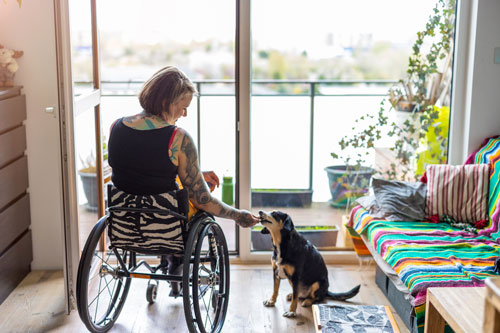Employment School Independent Living Medical
Independent Living Transitions

The philosophy of independent living is based on the idea that everyone deserves to be independent, whether they're at home, school, or work. People have the right to make their own choices and be self-sufficient. There are resources available to help students who are transitioning to living independently.
In deciding where to set up an independent home, think about these questions:
Where do you want to live?
- Near family or peer support
- Near college or work place
- Near public amenities (convenience stores, medical facilities or a bus depot)
What housing options do you prefer?
- With or without roommates
- Apartment/Studio Apartment
- House
What accommodations do you need?
- Is the house accommodating?
- Are the entrances and exits accommodating?
- Could it support assistive technology?
- Is it near public amenities?
Is transportation available?
- Are bus routes nearby?
- Are taxi services available?
- Are there any other transportation services available for persons with disabilities?
- Is there family or friends nearby that can provide transportation?
Are social supports available?
- Are there organizations or social groups nearby?
- Are there recreation and leisure activities nearby?
- Is there family and/or peer support nearby?
Centers for Independent Living
There are three Centers for Independent Living (CIL) in West Virginia. CILs receive grants to provide services to people of all ages who have physical, mental or sensory disabilities. Their goal is to give support to people with disabilities to help them become independent at home and other non-work settings. These centers and other resources are below:
- Appalachian Center for Independent Living - Empowers those with disabilities through advocacy, independent living skills training, peer support, transitions, employment, information & referral, and Community Living Services Program.
- LiveAbility - Provide tools, resources, and supports for integrating people with disabilities fully into their communities to promote equal opportunities, self-determination, and respect.
- Mountain State Centers for Independent Living - A community-based organization providing, advocacy, networking, and resources to people with disabilities and their families.
WV Resources
- Statewide Independent Living Council - Council to ensure that individuals with disabilities have access and community-based resources that allow for personal choice and independence goals.
- John H. Chafee Foster Care Program for Successful Transition to Adulthood (the Chafee program) provides funding to support youth/ young adults in or formerly in foster care in their transition to adulthood.
- Ron Yost Personal Assistance Services - Provides resources for individuals with severe disabilities to hire a personal assistant to help them perform essential daily living tasks.
- Regional Transition Navigator Services - Provides information, training, resources and services to at-risk youth and young adults ages 14-25.
- Take Me Home Transition Program – Provides services to support individuals who are elderly or physically disabled transition from facility-based living to their own homes in the community.
- WV Home and Community Based Waiver Services - Medicaid waivers that allow members to make the choice to remain home with family, and caregivers can receive help with care services.
- Aged and Disabled Waiver - A long-term care option that provides in-home care and community help. It allows a person to remain at or return home instead of receiving nursing home care.
- Children with Serious Emotional Disorders Waiver - Provides additional Medicaid support to children from ages three to 21 with serious mental, behavioral, or emotional health needs.
- Intellectual/Developmental Disabilities Waiver - Program is for children and adults with disabilities. The program provides services that help to teach, train, support, guide and assist members reach the highest level of independence possible in their lives.
- Traumatic Brain Injury Waiver - Provides support at home for members three years and older with a traumatic brain injury. It waives some of the rules to allow people who live in West Virginia to receive support to live at home.
- West Virginia Medicaid Personal Care Services - An in-home care program for West Virginia Medicaid members who may need help with their Activities of Daily Living (ADL).
- WV Olmstead Transition & Diversion Program - Assists people who live in facilities such as nursing homes, intermediate care facilities, state psychiatric facilities, rehabilitation facilities, etc. to transition into the community.
- ECHO Series: Transforming Care for Individuals with Intellectual and/or Developmental Disabilities - Institutionalization, Transitional Living Options and Care Team Support Options: This five session online training series is intended to provide education and resources to individuals, families and healthcare professionals about transforming care for individuals with intellectual and/or developmental disabilities.
- WVABLE - Helps West Virginians who developed a qualifying disability before the age of 26 achieve greater independence and financial security through the use of STABLE accounts. For individuals that receive Supplemental Security Income (SSI), there is a $100,000 limit before funds start counting against the $2,000 asset limit.
Guardianship and Supported Decision-Making
- Disability Rights WV Resources – Includes a reference chart to help determine if you should apply for guardianship, supported decision making information and agreements.
- Supported Decision-Making - Supported Decision-Making agreements can be used in combination with other legal arrangements, including Power of Attorney and limited guardianship. This site provides resources, toolkits and other planning tools.
- Supported Decision-Making: Frequently Asked Questions – Resource sheet developed by the ACLU Disability Rights Program.
